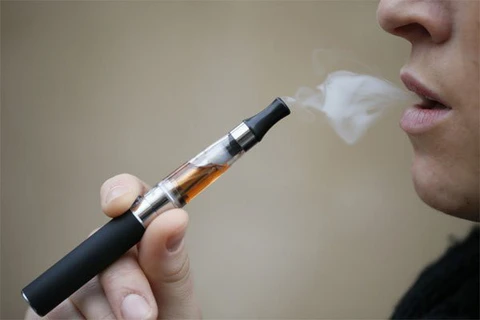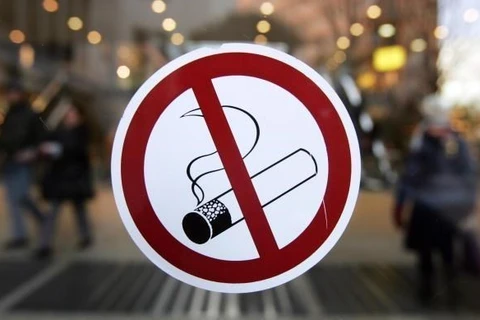 The Ministry of Health has warned about some next-generation tobacco products targeting the young (Photo: VietnamPlus)
The Ministry of Health has warned about some next-generation tobacco products targeting the young (Photo: VietnamPlus) Hanoi (VNA) – Thanks to substantial efforts, Vietnam has brought down the percentage of smokers. However, with the appearance of e-cigarettes and heated tobacco products, the country is facing the risk of a second wave of health effects posed by smoking.
Nguyen Huy Quang, Director of the Ministry of Health’s department for legal affairs, highlighted the issue recently while sharing information about proposals related to the management of e-cigarettes and heated tobacco products.
“Silent killer” claiming 8.2 million lives every year
Quang said an infectious disease like COVID-19 has spread around the globe and killed nearly 1 million people, disrupting all activities and becoming a great concern for all countries. Meanwhile, tobacco “silently” claims 8.2 million lives in the world every year.
Experts held that e-cigarettes and heated tobacco products are currently a worrying issue since next-generation products are targeting the young to create a new generation of smokers. E-cigarettes and heated tobacco products are not safe for children, adolescents and the youth.
Quang cited research findings that health effects of e-cigarettes and heated tobacco products are comparable to those of traditional tobacco ones.
Besides, these new products also pose some other dangers, he said, pointing out that smokers can take advantage of these products to take drugs publicly and e-cigarettes may cause explosions or fires.
Talking about harms of smoking, MA Nguyen Tuan Lam, a representative of the World Health Organisation (WHO) in Vietnam, said nicotine in tobacco, including e-cigarettes and heated tobacco products, poses serious health effects on smokers and those exposed to secondhand smoking. This chemical also raises newborns’ risk for complications like sudden death, hearing problems and abnormal brain development.
 Nguyen Huy Quang, Director of the Ministry of Health’s department for legal affairs, talks about the management of e-cigarettes and heated tobacco products (Photo: VietnamPlus)
Nguyen Huy Quang, Director of the Ministry of Health’s department for legal affairs, talks about the management of e-cigarettes and heated tobacco products (Photo: VietnamPlus) To adolescents, nicotine weakens their ability to exert self-control, concentration and memory. Some tobacco products could even be mixed with drugs, thus negatively affecting both physical and spiritual health of smokers. Therefore, it is necessary to minimise the young’s access to these products, Lam said.
Arguments for next-generation tobacco products don’t match reality
According to the Ministry of Health, while only 0.2 percent of the population used e-cigarettes in 2015, the rate among people aged between 13 and 17 alone has reached 2.6 percent in 2020, and even 7 percent in Hanoi and Ho Chi Minh City.
Quang said to attract users, tobacco companies advertise that e-cigarettes are useful for quitting smoking traditional tobacco products and do not cause side effects. Together with various marketing tactics targeting young people on social networks, creating eye-catching designs, and providing various flavours, they are trying to create the impression that vaping is trendy.
Nguyen Hanh Nguyen, manager of the programme on the prevention of harms of tobacco and non-communicable diseases at the HealthBridge Foundation of Canada in Vietnam, said tobacco manufacturers highlight next-generation products’ safety and usefulness in helping users to quit tobacco use despite the lack of scientific evidence, thus confusing consumers.
Echoing this, Nguyen Tuan Lam said arguments for e-cigarettes and heated tobacco products do not match the reality.
He warned that if e-cigarettes and heated tobacco products are allowed to be imported into Vietnam, the rate of young people using them will skyrocket. Then, it will be very difficult for the Government to curb the trend, and Vietnam will face a surge of nicotine addiction among the youth like the case in some countries.
Quang said the Ministry of Industry and Trade recently proposed multinational companies be permitted to import e-cigarettes and heated tobacco products on a trial basis. However, the Health Ministry has asked the Government to reject this proposal and take strong measures to ban the import and production of e-cigarettes and heated tobacco products in Vietnam.
Therefore, preventing the use of such products will be more effective than allowing the pilot import, which may result in rampant use of next-generation products apart from common cigarettes.
In its 2019 report on the global tobacco epidemic, WHO said that unlike the tried and tested nicotine and non-nicotine pharmacotherapies that are known to help people quit tobacco use, the organisation does not endorse e-cigarettes as cessation aids./.
























